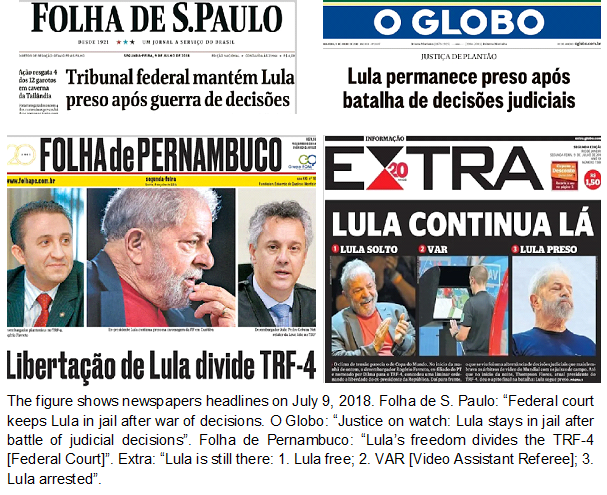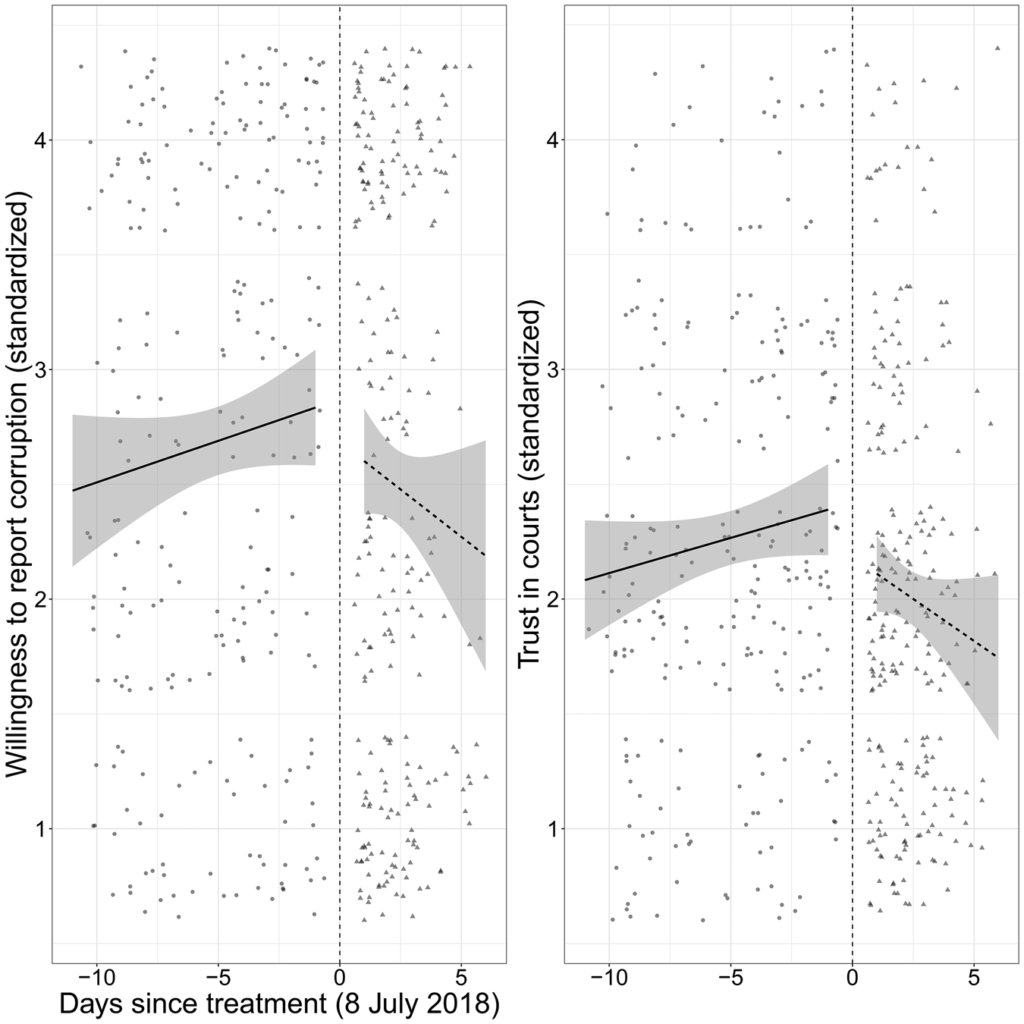
Corruption is a global issue that undermines trust in institutions, damages economies, and erodes the foundations of democracy. It is a topic that frequently makes headlines, and often, these headlines feature high-profile corruption court cases involving prominent politicians. Recent examples of such court cases can be found in France, South Africa, Croatia, South Korea, and Peru. But how do corruption trials influence ordinary citizens? And why does it matter?
In an era where corruption remains a persistent challenge and information spreads quickly through social media and 24-hour news cycles, the impact of well-known corruption court cases on public opinion is potentially more significant than ever. We have all seen the debates and discussions that unfold when a prominent figure faces corruption allegations or goes to trial. These public discussions often revolve around issues of justice, accountability, and the effectiveness of anti-corruption measures. Some argue that such cases can serve as a catalyst, motivating citizens to take a stand against corruption. They believe that exposing corruption at the highest levels can encourage people to be more engaged in politics and demand better conduct from their elected representatives. Others caution that bringing high-profile corruption cases to light may lead to cynicism and disillusionment with politics. They worry that repeated exposure to high-profile corruption could erode trust in the political system and eventually weaken political participation.
Understanding the impact of corruption trials on citizens is a critical aspect to consider in democracies, but it is also empirically challenging. For instance, surveying respondents about their assessments of trials and political attitudes can obscure the direction of causation. Hypothetical scenarios in experiments may address this issue but lack real-world applicability. To overcome these challenges, a promising alternative is to rely on unexpected and salient events, using a strategy known as an Unexpected Event during Survey Design (UESD). This strategy involves identifying widely broadcasted judicial decisions that occurred during public opinion surveys.
Two studies utilizing UESD provide evidence of the discouraging effects of corruption trials on public opinion. These effects include diminishing trust in various institutions, not just the courts, and perceptions of increasing corruption. One study focuses on cases in Argentina and Costa Rica where prominent politicians were sentenced on corruption charges. Another paper focuses on a case in Portugal in which a long-term investigation did not lead to punishment. Despite the contrasting nature of these judicial outcomes, they share a commonality in their impact on public opinion, notably in their capacity to erode trust in a variety of institutions, not just courts. Also, these court decisions shape public opinion in a way that is similar to corruption scandals, as documented in previous studies.
My recently published paper in Government & Opposition contributes to that strand of research by using UESD to examine the consequences of a different type of judicial behavior in the realm of high profile corruption court cases: judicial inconsistency, when there is disagreement among different judges when adjudicating legal matters.
The inconsistent decisions I have identified took place in 2018 during the fieldwork of Latinobarometro in Brazil, and involved judicial decisions issued in a corruption case involving Luís Inácio Lula da Silva (known as Lula), the president of Brazil between 2003 and 2011 – and elected once again in 2022 -. The event involved four judges issuing contradictory decisions concerning Lula’s provisional release from jail, all on the same day. As in other UESD studies this event is taken to be exogenous, reducing the risk of reverse causality and it is real and not artificially created, which reinforces external validity.
Differently than in previous studies, however, the judicial decisions I examined in my paper did not alter the defendant’s objective situation. Lula was in jail both immediately before and after the decisions. This aspect provides greater confidence that the most significant aspect of the decisions was the disagreement between judges rather than the actual outcome of the ruling, or the re-examination of scandalous evidence related to the corruption investigation. This interpretation is supported by numerous newspaper headlines from the day after the event, which used war-related language to describe the event and emphasized the divergent positions held by different judges in their rulings, instead of focusing on the corruption case itself, as shown below:

By comparing attitudes of citizens interviewed before and after the judicial decisions, I find that exposure to the event decreases willingness to report corruption to authorities and trust in courts – shown in the figure below:

As shown in the table below, I also find that exposure to the event does not affect trust in other institutions and neither corruption perceptions. The effect also does not seem to be driven by Lula’s supporters, who had more reasons to be displeased with the outcome of the rulings as Lula remained in prison.

Therefore, other than exploring a different type of judicial decision in the realm of a high-profile corruption case I also observe a different pattern of public opinion consequences. I speculate that this might be indicative of an additional mechanism explaining how judicial decisions affect public opinion.
In previous literature, there are three explanations for the discouraging effects of high-profile corruption court cases on public opinion:
- Fatigue: Citizens can become unresponsive to new information about corruption
- Motivated Reasoning: Citizens may ignore information about corruption that clashes with their political preferences
- Priming: Citizens might paradoxically focus on how widespread corruption is instead of appreciating the efforts to control it.
My paper shows that how judges behave affects how citizens react to corruption trials. I don’t argue that the existing explanations are incorrect; rather, I believe they are incomplete. I propose an additional explanation that focuses on how citizens assess the performance of anti-corruption efforts. My suggestion is that citizens often rely on mental shortcuts, known as heuristics, to judge whether public institutions are genuinely committed to combating corruption. While citizens generally disapprove of corruption and want institutions to fight it, they often struggle with uncertainty about the true commitment of these institutions. These shortcuts can be related to institutional performance or other factors. I speculate that one of these heuristics is judicial inconsistency, which influences assessments of institutional performance. Building on previous research, I argue that judicial inconsistency may lead ordinary citizens to believe that the courts are influenced by factors other than a sincere commitment to anti-corruption efforts.
Ideally one should have attempted to determine if contradictory decisions affect how citizens view institutions’ commitment to fighting corruption, whether sincere or not. But I face limitations when using survey data from Latinobarometro. Still, my paper suggests that uncertainty about anti-corruption efforts should be recognized as a natural part of this issue, not just for regular people but also for researchers. This also hints at the idea that shortcuts in thinking (heuristics) may play a role in how we handle this uncertainty, which I hope inspires more research in this area.
References:
Al Jazeera. 2023 “Before Trump, which other world leaders were charged or jailed?” Available at: https://www.aljazeera.com/news/2023/4/4/before-trump-which-other-world-leaders-were-charged-or-jailed
Ares, Macarena, and Enrique Hernández. 2017. “The corrosive effect of corruption on trust in politicians: Evidence from a natural experiment.” Research & Politics 4, no. 2. https://doi.org/10.1177/2053168017714185
Barbabela, Letícia. 2023. “Judicial Inconsistency and Citizen Anti-Corruption Demobilization: Evidence from Brazil.” Government and Opposition, 1-20. https://doi.org/10.1017/gov.2023.36
Magalhães, Pedro. 2022. “When corruption investigations come to nothing: A natural experiment on trust in courts.” Governance. https://doi.org/10.1111/gove.12754
Poertner, Mathias, and Nan Zhang. 2023.”The effects of combating corruption on institutional trust and political engagement: evidence from Latin America.” Political Science Research and Methods, 1-10. https://doi.org/10.1017/psrm.2023.4
